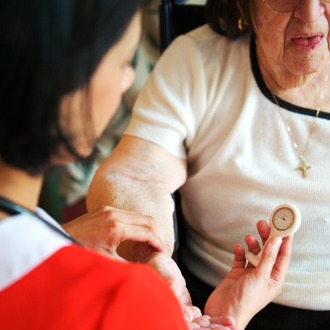A day as an extensivist GP

Profile: Dr Margaret Lupton
Age 48
Role Extensivist GP for a service for older patients
Location Blackpool, Fylde & Wyre
Hours per week Two full days (9am-5pm) and two half days a week, with a half day every week for SPA (‘Supporting Professional Activity’ time).
8.10
I leave the house to go see a patient in her home. Before they come onto the extensive care service, all patients have an assessment at home by a well-being support worker followed by a 1.5 hour appointment in the clinic (45 minutes with their care co-ordinator followed by 45 minutes with me, the extensivist).
Our service started in June 2015 and I joined in January this year. The aim of the service is to provide holistic ‘wrap around’ care for patients over the age of 60 with complex needs. Extensive care was originally an American idea with hospital geriatricians providing the extensivist doctor role. In our service we have one consultant geriatrician, working with several GPs.
We aim to reduce the burden of this cohort of patients on the local health services (their GP, out of hours, A&E, the acute wards and outpatient departments) and improve their wellbeing. Patients are referred to the service by their GP and we take over all of their acute care, while the GP continues to provide routine QOF-related care and repeat prescribing.
We have four community based clinic bases that we refer to as ‘hubs’. Most of our hubs are in primary care centres, but we don’t have all of the facilities of a GP surgery.
9.00
I meet the care co-ordinator at the clinic base and we head to the patient’s home. Normally I’d see the patient in the clinic, but our first patient is totally housebound and can’t manage to get to clinic even with patient transport. One thing I love about home visits in this job is that they are part of the clinic, unlike in ordinary general practice where we squeeze them in as an afterthought.
We talk to the patient to try and build up a picture of her needs. Karen is in her mid-60s and hasn’t been out of her room for more than six months. She is overweight and has heart failure, chronic kidney disease, type 2 diabetes, atrial fibrillation, COPD, ischaemic heart disease and chronic anxiety. She has been in and out of hospital for the past few months and frequently phones the out of hours GP service. She has carers who come and make sure she eats and drinks, and one of them walks her dog. She’s quite happy with her life but says it would be nice to go outside.
10.30
The next two patients are also new and I see them back at the clinic base, going through their problems in a similar way to Karen.
12.00
We discuss the patients we’ve seen this morning in a post-clinic ‘huddle’, a face-to-face discussion between the team. For each patient we decide on an extensivist plan.
Karen is fairly typical of the patients we look after: over the next few months her wellbeing support worker will address her social isolation, her care co-ordinator will try to improve her mobility and I, along with the pharmacy members of the team, will optimise her medication and address her polypharmacy. We will also explore contingency planning, long-term planning and end of life decision making while she is on the service.
Like most doctors, I work through my lunch so I can go home on time.
13.00
I have four review patients in this afternoon clinic.
Patients attend routinely every three months for a 45 minute extensivist review. I look back at the patient’s initial assessment and systematically go through the plan made at that time to see where we’re up to and make sure things have been dealt with.
For one patient it’s their nine month review so I also look at their previous doctor review appointments and the results of blood tests we’ve done. We can access the whole GP record and hospital record too. Sometimes at the three month review I’ve picked up a chest infection, urine infection or new symptoms suggestive of cancer. It’s like detective work and similar to ordinary general practice apart from the fact that you are actively looking for problems.
16.00
The clinic finishes. We don’t have a post-review clinic face-to-face huddle, so I have an hour after clinic to write up the notes.
17.00
I leave the clinic and head home.
The big difference between our appointments compared with ordinary general practice is that we aren’t responding to a patient’s presenting complaint but instead we’re looking for problems that we can do something about. I was worried when I decided to do this job that I would be bored, but it’s quite the opposite – it is the most challenging and rewarding work I have ever done as a GP.
Pulse July survey
Take our July 2025 survey to potentially win £1.000 worth of tokens











